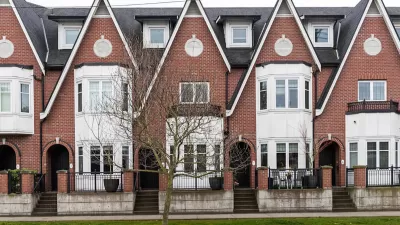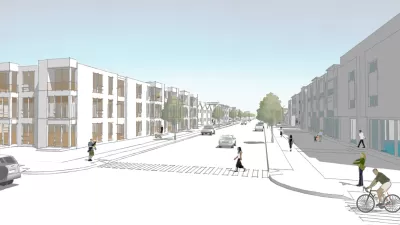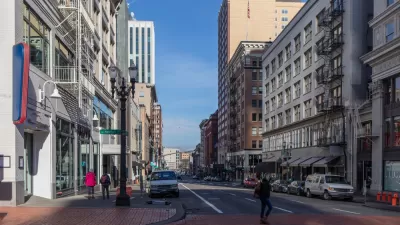OPB investigates the flood of new apartment buildings going up in downtown Portland and finds that two-thirds lack any motor vehicle parking - which is great for renters without cars seeking affordable housing, but can anger the neighbors.
Reporter/producer Rob Manning finds the new, parking-less buildings are going up because of new demand, not a change in city parking policy. What's creating the demand? Affordability, and a new wave of renters not needing auto parking.
"The cost of parking would make building this type of project on this location unaffordable," says Dave Mullens with the Urban Development Group, speaking of the 50-unit Irvington Garden in a close-in Northeast Portland with no parking places.
"Parking a site is the difference between a $750 apartment and a $1,200 apartment. Or, the difference between apartments and condos," he says.
"He says the Irvington Garden filled within weeks of opening, and has remained that way. He says the majority of renters don't have cars – though some do, and park on the street."
Portland parking policy is explained by city planner Tim Heron who "says the new push to build without parking fits within current zoning – and is consistent with the city's planning goals."
"Portland wants to grow up in terms of its density – and parking cars, meaning making the space and creating the space for them to park on a site can eat up a lot of space. So we've seen an increase in developers wanting to exercise a no-parking option, and use that space for units or for retail."
However, that may not sit well with some neighborhoods who "worry that without parking provided, tenants would jam the side streets with parked cars."
"Planners and developers say successful, no-parking projects have two things in common: frequent transit service, and a nice, walkable neighborhood."
Thanks to Len Conly
FULL STORY: No Room For Parking At Many New Apartment Complexes

Alabama: Trump Terminates Settlements for Black Communities Harmed By Raw Sewage
Trump deemed the landmark civil rights agreement “illegal DEI and environmental justice policy.”

Planetizen Federal Action Tracker
A weekly monitor of how Trump’s orders and actions are impacting planners and planning in America.

The 120 Year Old Tiny Home Villages That Sheltered San Francisco’s Earthquake Refugees
More than a century ago, San Francisco mobilized to house thousands of residents displaced by the 1906 earthquake. Could their strategy offer a model for the present?

In Both Crashes and Crime, Public Transportation is Far Safer than Driving
Contrary to popular assumptions, public transportation has far lower crash and crime rates than automobile travel. For safer communities, improve and encourage transit travel.

Report: Zoning Reforms Should Complement Nashville’s Ambitious Transit Plan
Without reform, restrictive zoning codes will limit the impact of the city’s planned transit expansion and could exclude some of the residents who depend on transit the most.

Judge Orders Release of Frozen IRA, IIJA Funding
The decision is a victory for environmental groups who charged that freezing funds for critical infrastructure and disaster response programs caused “real and irreparable harm” to communities.
Urban Design for Planners 1: Software Tools
This six-course series explores essential urban design concepts using open source software and equips planners with the tools they need to participate fully in the urban design process.
Planning for Universal Design
Learn the tools for implementing Universal Design in planning regulations.
Clanton & Associates, Inc.
Jessamine County Fiscal Court
Institute for Housing and Urban Development Studies (IHS)
City of Grandview
Harvard GSD Executive Education
Toledo-Lucas County Plan Commissions
Salt Lake City
NYU Wagner Graduate School of Public Service





























